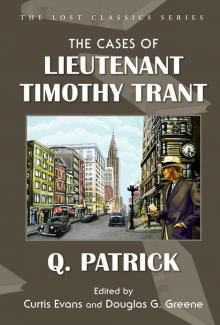- Home
- Q. Patrick
The Cases of Lieutenant Timothy Trant (Lost Classics) Page 5
The Cases of Lieutenant Timothy Trant (Lost Classics) Read online
Page 5
“That all went with her pose as an authoress,” explained Leslie caustically. “Lots of bad writers go arty with colored inks and smocks and things.”
“I see.” Lieutenant Trant picked up a cheque book from the desk and looked at her soberly. “I suppose it’s also arty to write cheques in red ink? Miss Lucas paid household bills today by cheque; all the stubs are filled in with red ink. And here’s where I become puzzled.” He indicated two quill pens which lay on the desk, resting on supports between two ornamental inkwells. He picked up one of the quills, holding it out for Leslie’s inspection. “As you see, the point of this pen is stained with red ink. And yet both the wells are filled with green ink. I haven’t been able to locate any red ink at all.”
“She probably wrote the cheques with a fountain pen.”
“Ingenious, Miss Cole. But I’ve had the house searched. There’s no fountain pen.”
“Then she probably used all the red ink in the well today writing the cheques, found she hadn’t any more in the house, and filled up with green instead.”
“Even more ingenious, Miss Cole. I can see you don’t puzzle easily.” Lieutenant Trant’s admiring grin broadened. Then abruptly abandoning the subject of ink, he picked the cheque book up again, rapping with it on his knuckles. “Perhaps you can help me on another point. Miss Lucas’ cheque book shows a very comfortable bank balance. She obviously hadn’t made anything by her literary efforts. I’m wondering where that bank balance came from. Could she, do you think, have been interested in a refined form of—extortion?”
Leslie blinked. “Blackmail, you mean?”
“If you like to put it that way. After all, she has been murdered. And people seldom get murdered unless they’ve given someone a motive for wanting to murder them.” The detective was becoming more and more amiable. “Here’s where you could be so valuable, Miss Cole. You knew her. Was she the type of girl who could have indulged in that sort of thing?”
Leslie considered a moment. For her, judgments on character, like judgments on manuscripts, only came with weighty reflection.
“I suppose it’s possible. She was fairly unscrupulous. Certainly when she had her novel to sell, she exploited her friends just as much as she could—Gordy Heath, Mr. Boyer, me, and Faith Felton. She didn’t threaten, of course, but she played on the heartstrings with all stops full out.” She paused. “But have you any evidence?”
“I rather think so.” The detective crossed to a corner of the bookcase where a small open door revealed a miniature safe built into the wall. “Found this hidden behind books. Afraid we had to do a little blasting to get it open. A couple of items inside interest me.”
He took a thin cardboard folder from the safe. “For example, Miss Cole, I’d like you to tell me exactly what the relationship was between Miss Lucas and—Mr. Boyer.”
“Relationship!” Leslie stared. “There wasn’t any relationship. She was just his secretary, and a good one. He was kind to her; the way he’s kind to everyone. Certainly there was nothing else.”
“Mr. Boyer must have made quite a pile on that novel of his. She couldn’t have been putting the screws on him?”
“Good heavens! I’ve never heard anything so far-fetched.”
“Then what do you make of this?”
He handed Leslie the folder. She produced her horn-rimmed spectacles from her pocketbook, lodged them on the end of her nose and opened the file.
Inside were three separate papers clipped together. On top was a telegram sent to Miss Lucas from the police in Labrador. It stated that a Pierre Bernard had died of pneumonia at Fort Craig, giving a date two and a half years before, and added the address of the nearest living relative—Madame Héloise Bernard, his mother.
“It occurred to me.” said Lieutenant Trant, “that she might have been trying to dig up some dirt.”
“Oh, no. it was nothing like that. I know all about this.”
Leslie told him what the majority of America’s reading public already knew from the blurb on the jacket of The Story of Mark, the tale of the young French-Canadian assistant who had been cut off with Robert Boyer in the surveyor’s hut and whose death and the subsequent loneliness had induced Robert to write the book.
“Mr. Boyer knew Bernard’s people were poor,” she concluded. “When the book was so successful, he wanted to do something to help them. He got Minna, as his secretary, to locate the boy’s mother through the police.”
“I see,” said Trant. “Then that explains the other two letters.”
Leslie looked at them. The first was a brief, touching note from Madame Bernard in French, thanking Robert for a substantial cheque and enclosing her son’s last letter to her as a— “memento of friendship.” Pierre Bernard’s letter itself was attached. Written in meticulous French longhand, it was a typical young man’s letter to his mother, skirting around technical details, enthusing over Robert as a boss and complaining half-humorously of the cold.
Leslie handed the file back, thinking how typical of Robert it was that, when telling her the story, he had considerably minimized the size of the cheque he had actually sent to his dead friend’s mother.
“There’s nothing for you there,” she said. “It only shows how Robert was as generous to the Bernards as he always was to Minna herself.”
“Miss Lucas seemed to have quite a knack for attracting generous male friends.” Lieutenant Trant’s gaze was slightly quizzical as he took another document from the safe and gave it to her. “Perhaps there’s something in this for me.” Leslie took it and looked at it. It was a five-year lease on the house Minna lived in. To her astonishment she saw that the owner’s signature at the foot showed as David Warren Walker.
“A very generous young man,” murmured the detective, as Leslie still stared, “particularly considering the fact that his engagement to her must already have been broken at the time.”
He was indicating a paragraph in the middle of the closely typed, formal document. It stated that the rental on the house should be set at the nominal sum of one dollar a year.
Leslie glanced up, her forehead puckered in a frown. “So—so Dave owns this house! He was letting Minna live here. And you think she railroaded him into it.” Struggling with her thoughts, she added, “I don’t see why. You know he was responsible for that automobile accident when her face was scarred. He—he probably just let her have the house free as a kind of reparation.”
The detective was smiling again. “You’re determined to look on the sunny side, aren’t you? I wonder just where you’d locate the sunny side of this little number.” The smile went suddenly as he took a third letter from the safe and handed it to her. “Polyanna this one off if you can.”
Leslie read:
State Parole Board, Poole City, Poole County.
Miss Frances Fels. c/o Miss Minna Lucas. New York City.
Miss Fels:
This Board has been informed that subsequent to your release on parole from the Women’s State Penitentiary, you have ceased to reside in Poole County and have established your domicile in the State of New York.
By a special interstate arrangement, it is permissible for you to report to a local parole officer in New York City at the address given below. Reports must be made on the fifteenth of every month for the next twelve months.
Failure to make regular reports to the parole officer in question will be held as a serious violation of the Parole Code. And we shall be obliged to take immediate steps to effect your extradition and to return you to the State Penitentiary to finish the full term of your sentence.
Charles Ludwig,
Chief Parole Officer, Poole City.
For one moment after she had read that shockingly unexpected document, Leslie kept her eyes from meeting those of Lieutenant Trant. Her thoughts were swirling. Frances Fels... F. F.... Inevitably there rose up the image of Faith Felton’s white face when she heard the news of Minna’s death, the memory of the actress’s instinctive movement toward the stairs and
of her voice, urgent and husky, saying: “But the police are coming... there’ll be papers, things that I should be destroyed...”
Trant’s voice broke into her jumbled reflections. “With this in her possession Miss Lucas might easily have persuaded one of her female friends to be—generous too.”
Leslie did not speak.
To her surprise the detective’s face seemed genuinely sympathetic now. Very quietly he said: “Miss Cole, there are two ways to handle a case like this. One way is to crowd all suspected parties into Center Street and shout at them until something happens. The other way is to use a little finesse.” He looked apologetic. “I’m afraid I have a bent toward finesse.”
“I’ve noticed that,” remarked Leslie.
“I’m glad.” Lieutenant Trant did not smile. “Because you may possibly see my position. I am looking for murder motives. These various documents obviously suggest certain motives; but they also look very much like extortion material. And the police are extremely reluctant to make use of blackmail information.”
He paused. “Of course, since this is a case of murder, I’m obliged to follow up every lead. Tonight I shall have to question both Miss Felton and Mr. Walker. But, if they are not involved in this actual case, they might easily be submitted to unwarranted embarrassment. That is something I want to avoid.”
For one brief second, which put Leslie instantly on her guard, he glanced down at his left thumbnail.
“This is how I propose to avoid it. It’s obviously impossible for me, in my official position, to—prepare them in any way. But I thought that if you, as a personal friend, just dropped in and told them exactly how much I know, at least it would be giving them a sporting chance to get their stories straight.”
In spite of his friendly smile, his persuasive eyes, Leslie felt, for the first time since that interview started, her old sensation of distrust. Such quixotic generosity coming from the canny Lieutenant Trant was beyond the realms of belief, unless somewhere buried in the bait was a skillfully concealed hook.
“Will you do that, Miss Cole?”
“You really want me to warn them?”
“Of course.” Trant’s smile was almost benign. “I should have thought you would be only too willing to do that for your—friends.”
Obeying reason rather than instinct. Leslie said: “All right. You want me to go straight away?”
“No, just one moment, Miss Cole. I’m afraid I have to make use of you on another little point. A rather interesting point—a point of typing. You type?”
“Why, y-yes.”
“You type well?”
“Quite well. I used to type all my own letters at Morton and Bidlake.”
“Then I think you should be able to confirm a suspicion of mine.”
He bent and picked up one of the loose manuscript pages of Minna’s novel from the floor, handing it to her. Leslie gave a little shiver as she noticed a dry red stain on the edge. But he said quickly:
“Don’t worry, Miss Cole. That isn’t blood—just a smudge of Miss Lucas’ red ink. Sorry I chose that particular page, but I merely want you to cast a professional eye over the actual typing. Looks like a very smooth job to me. Did Miss Lucas type it?”
“I’m sure she did. She was an expert stenographer of course.”
“How about this?”
The detective handed her a single sheet of manuscript which he had taken from the safe. Leslie saw that it was typed in purple, on a different machine and in the French language. The irregular lines were interspersed with numerous pencilled corrections.
“This must be part of a rough draft of the French translation of The Story of Mark,” she said.
“Then the book has been translated?”
“Heavens, yes. Into seven or eight different languages. I collect Mark editions, and I myself have a copy of the French, German and Spanish editions, each autographed by the translator.”
Trant was watching her. “What I really want to know is—did Miss Lucas type this?”
“Oh, no. It was translated in Paris. The translator died soon after publication, and Robert was sent all the Mark manuscripts. Minna was his secretary at the time. That’s how she must have got this.”
“Thank you. Now, Miss Cole, I want you to give me a demonstration on Miss Lucas’ typewriter.” He looked at her soberly. “I want to know how well an efficient typist types with gloves on.”
Leslie was past the stage of registering surprise as he slipped into the typewriter the loose page of French manuscript so that she could write on its back.
“Just copy something—anything. This telegram, for example.” He laid the telegram from the Labrador police by the machine and drew up a chair for her. “Type the first two lines as you would normally; finish the rest with your gloves on.”
Perched on the chair like a small, bespectacled owl, Leslie obeyed. Lieutenant Trant studied the finished product over her shoulder. Then he pulled it out of the machine.
“As I thought,” he murmured. “The part you typed with gloves on is only a little less smooth than the rest of it.”
Leslie was unable to control her curiosity any longer. “What is this all about anyway?”
“It’s about that note Mr. Keath said he received from Miss Lucas asking him to start the party for her this afternoon.” Trant’s voice was suddenly ominous. He produced the note from his pocket, unfolding it. “Take a look for yourself. The typing is very uneven. Some letters are joined together; some are much darker than others. Not at all up to Miss Lucas’ standard. I thought maybe she’d written it in a hurry before going out and had not bothered to remove her gloves. But you’ve proved very efficiently that even with gloves on a self-respecting typist doesn’t type as irregularly as this.”
Leslie stared. “Then you mean...”
“There’s only one thing to mean. This note was written on that typewriter, but by someone less proficient than either Miss Lucas or yourself.”
“You don’t think Minna wrote it?”
“I’m sure she didn’t.”
“Then who wrote it? Why...”
“Come, Miss Cole, I’m not helping you. You’re help ing me, and you’ve been very helpful indeed.” Lieutenant Trant’s voice was smooth but unyielding. He glanced at his watch. “I think it’s time for you to run your little errands now. Perhaps you’d tell me where you’re going first; I don’t want to visit anyone before they’re ready for me.”
“It’s too early to pick Faith up at the theatre. I’ll go to Dave Walker.”
“All right.” Lieutenant Trant had crossed to the desk and with a clip was attaching the copy of the telegram Leslie had just typed to other documents. He handed them to her. “While you’re about it. I think you might return Mr. Walker his lease. You might show Mr. Boyer that telegram, too. And the letter from the parole board—I’m sure Miss Felton would feel more secure with it in her own possession.”
Leslie was gazing at him incredulously now. Lieutenant Trant was investigating a murder case; he had discovered certain facts which gave certain people potential motives for murder. And yet he was asking her, Miss Leslie P. Cole, not only to warn those people, but to return to them documents which might be vital clues.
Lieutenant Trant was either wildly altruistic, very stupid, or—something else.
As Leslie stuffed the papers and her spectacles into her pocketbook, she decided that the detective almost certainly belonged in the last, unlabelled category.
* * *
As a taxi sped her through the wintry streets toward the apartment house where Dave Walker lived with his mother, Leslie felt distinctly nervous. She had known the young lawyer fairly well when he had been beauing Minna. But they had never been intimate. Dave had a rough, almost harsh exterior which did not suggest easy confidences, and she had never discussed, either with him or with Minna herself, the cause underlying their sensationally broken engagement.
She knew, of course, that a great many people had condemned Dave for wha
t looked like a piece of callous heartlessness; she knew also that the fountain of calumny had gushed afresh following his engagement to Yvonne Prévost. But Dave had scorned explanations. He had gone on his own independent way, a little grimmer, a little older looking, but always either indifferent or impervious to gossip.
Although, as Lieutenant Trant had pointed out, it was for Dave’s own good, Leslie did not relish the prospect of intruding into his private affairs.
Dave himself opened the door for her. His blond face with its stubborn, rather sulky eyes registered surprise. “You, Leslie!”
“May I come in?”
He hesitated. “Sure. Mother’s gone to bed. But Yvonne’s here.”
“I’ve come to talk about Minna, Dave. Is that all right in front of Yvonne?”
“All right?” He gave a harsh laugh. “If there’s anything Yvonne doesn’t know about me and Minna, it’d be news to me too.”
He took her into a small, rather dreary living room, where Yvonne Prévost, very thin and dark, was pacing restlessly back and forth. When she saw Leslie, her large eyes went very alert.
Dave said: “She’s come about Minna. What is it, Leslie?” Leslie produced the lease from her pocketbook.
“Lieutenant Trant told me to give you this.”
Yvonne swirled to Dave’s side, staring at the document over his elbow. Dave’s mouth went very tight.
“I knew he’d find this somewhere. But why the devil is he giving it back to me?”
“Don’t expect me to interpret Lieutenant Trant.” Leslie sank wearily into an overstuffed chair. “He’s coming to see you himself soon. He said he thought Minna might have forced you into letting her have the house free by some sort of—blackmail. He said it was against his policy to make use of blackmail information unless people were warned first.”

 Death Goes to School
Death Goes to School Hunt in the Dark
Hunt in the Dark The Cases of Lieutenant Timothy Trant (Lost Classics)
The Cases of Lieutenant Timothy Trant (Lost Classics) Death for Dear Clara
Death for Dear Clara S.S. Murder
S.S. Murder Death and the Maiden
Death and the Maiden The Grindle Nightmare
The Grindle Nightmare Cottage Sinister
Cottage Sinister The Girl on the Gallows
The Girl on the Gallows